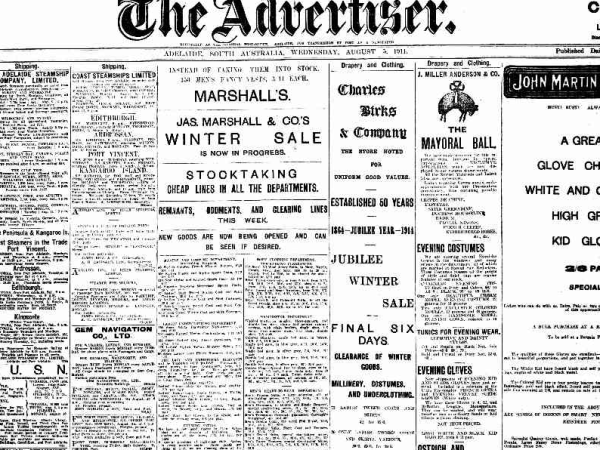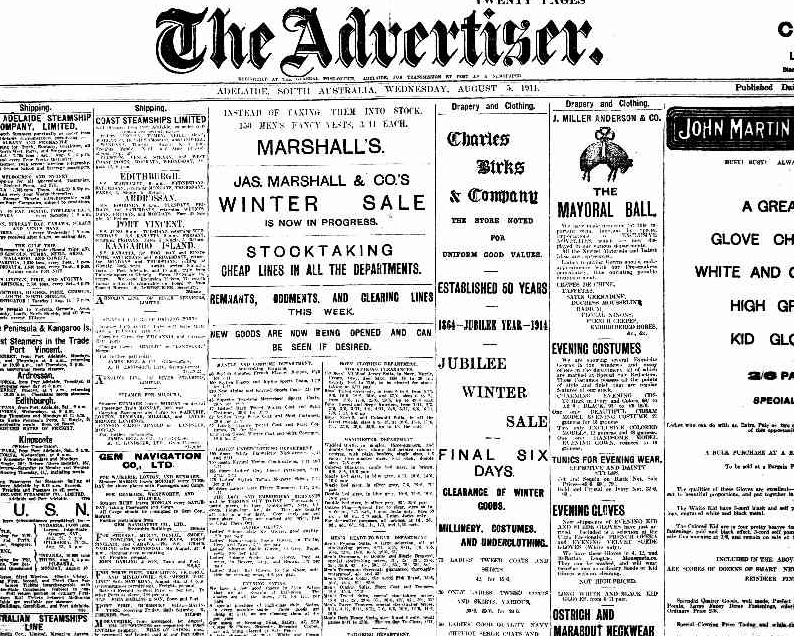Advertiser – October 1916
Tue 3 October 1916 p9
Letter from South Australian Arthur Blackburn, printed in the Advertiser. It tells about the battle at Pozieres, in July, for which he was awarded the Victoria Cross
Doubtless you will have seen in the papers allabout our capture of Poziers… We had a fearful scrap, most of it by night. The Bosches are undoubtedly about as dirty fighters as anyone can well be, but with it all they fight hard… We fought solidly for three days and nights, almost without stopping, and drove our way foot by foot through the village until we had got right through and on to some high, commanding ground… I was put on a pretty important job on the first morning at daylight. There was a trench from which we were enfiladed. We had just got a footing in it and I had orders to work my way up it with bombs. It kept me busy for 10 hours, but in the end I cleared it and captured 550 yards of it. Goodness only knows how I got out of it alive, as 17 times the man behind me was skilled and 22 men behind me were wounded. The ‘heads’ were kind enough to congratulate me on what I had done, so it was apparently pretty important… While working my way up the trench I came upon a lad of about 19 chained by the hand and waist to a machine gun. Fancy having to chain your men to guns…
Friday 6 October 1916 p 8
Arrangements are being made for the League of Loyal Women shortly to issue badges to women whose husbands, sons, brothers, and fathers have enlisted In the Australian Imperial Forces. It was felt by the League that this would be a fitting way of honouring the women who have made sacrifices and to foster a pride in the regiments in which their men have served or are serving.
Some women will be entitled to wear a number of badges, which will be linked together in the manner of military clasps issued to soldiers… Each applicants will be carefully verified so that the wearing on the tokens will be restricted to those entitled to them.
14 October 1916 p15
NATIONAL SERVICE: REFERENDUM ISSUES
A democracy which enjoys the right of manhood suffrage and denies the duty of manhood service, is illogical. The people who vote “Yes” on Referendum Day will have a good conscience, whatever the future has in store for us. The opponents of compulsory national Service are only free to oppose it because other people are fighting for them at the front.
18 October 1916 p6
THE HEALTH OF THE TROOPS
The principal medical officer, Keswick Barracks, reports that no case of Cerebro-spinal meningitis has occurred in the military camps since August 25 last. The health at all camps is very satisfactory
17 October 1916, p9
ANGLICANS AND CONSCRIPTION: THE SYNOD SAYS YES
The Anglican Synod of Australia carried the following resolution to-night regarding conscription proposed by the Bishop of Willochra, and seconded by the Bishop of Tasmania: – “”That the Church recognises -that to call upon all the citizens of Australia for personal service during the present war is one of an altogether unprecedented, and exceptional character, inasmuch as the liberty both of Australia and of the, world is at stake, and without liberty all spiritual progress is grievously imperilled. This Synod believes that at the present crisis every man is bound in honour to place his services at the disposal of his country, and seeing that the Government of the Commonwealth, with all the weight of its knowledge and authority, is asking for power to call up the necessary reinforcements for military service abroad, the Synod appeals to all members of the Church to support the Government at the referendum on October 28.”
18 October 1916 p8
FRANZ FERDINAND’S MURDERER DEAD.
Kerovie, who was serving a sentence of life imprisonment for the murder of the Archduke Franz Ferdinand of Austria not long before the war, has died in the Moellendorff military prison.
19 October 1916, p9
WOMEN FAVOR “NO.”
MISS VIDA GOLDSTEIN AT THE TOWN HALL.
The prospect of hearing Miss Vida Goldstein’s views on the subject of the referendum attracted a large number of women to the Town Hall on Wednesday afternoon. The meeting was entirely for women. Mrs. A. E. Verco (president of the women’s section of the Anti-Conscription Council) presided. The proceedings were of an enthusiastic nature, and at times some excitement prevailed.
Mrs. Verco repudiated the suggestion that the anti-conscription campaign was supported by German money. (Cheers.)… Mr. E. F. Russell, of Victoria, said conscription, militarism, and war struck most at the homes and hearts of the women-folk. They were now being asked to bind upon a democracy the shackles of conscription, which had been the curse of the old world. The whole spirit of militarism, responsible for the war in Europe, was the result of the introduction of conscription and the military caste. If conscription were once introduced in Australia it would never go out.
… Miss Goldstein said she brought greetings from the women in Victoria, where they were having a magnificent campaign. All who were working against conscription were united. She was sure this crisis would result in the formation of a new party. She was sorry she had not fought against the boy conscription of the Defence Act. She had not then realised what it meant.
THE ANSWER OF AUSTRALIA
SCRUTINY NOT YET COMPLETE
A MAJORITY AGAINST CONSCRIPTION
OVERSEA SOLDIERS’ VOTES TO COME
YES LEADS IN THREE STATES: SOUTH AUSTRALIA DECIDES FOR NO
PROGRESS TOTAL FOR AUSTRALIA.
YES – – – 800,384
NO – – – 887,335
Majority for No-86,951



